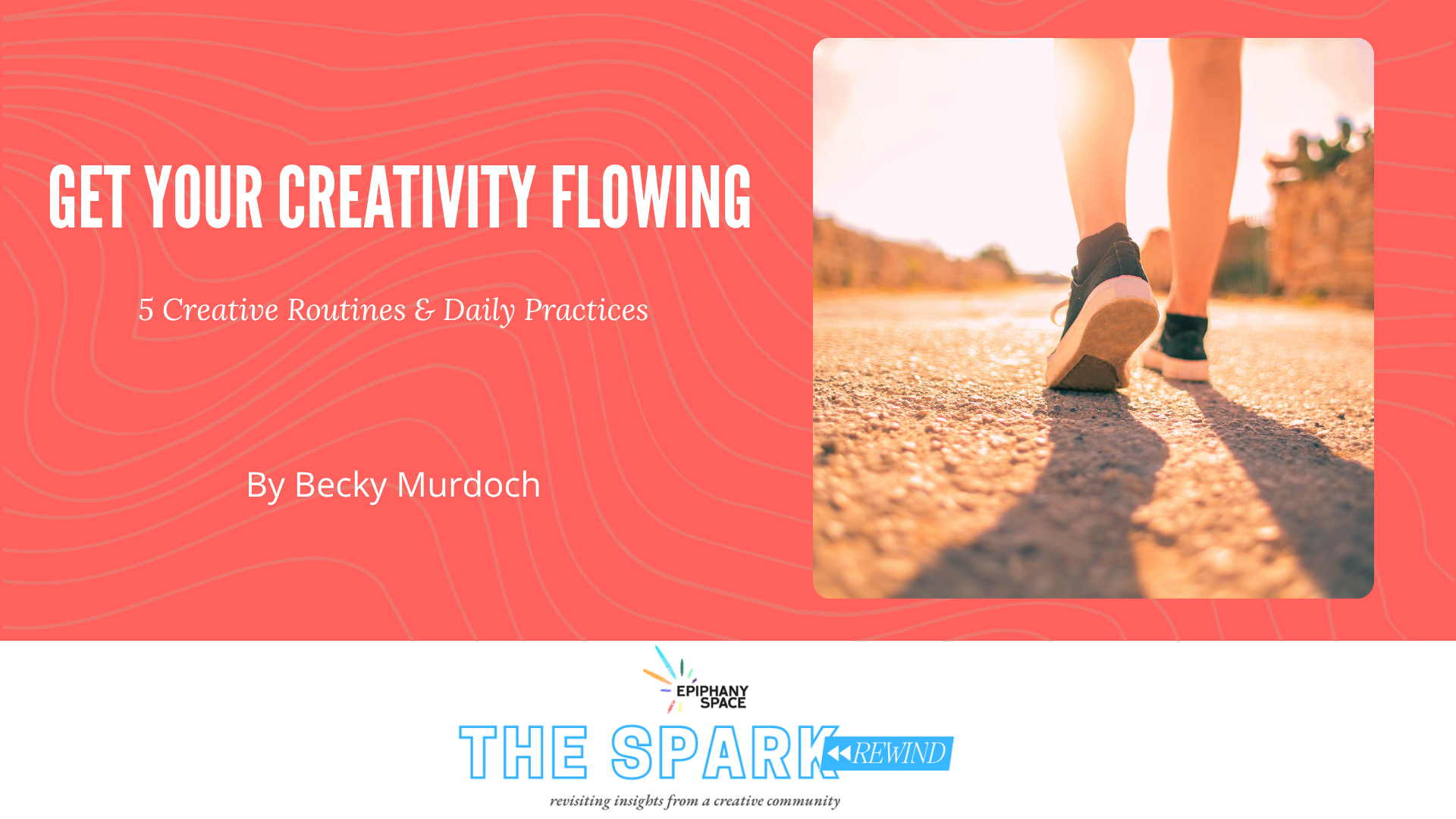Article
Two Roads Diverged – Finding Your Path to a Creative Routine | By Steven W. Alloway
Two Roads Diverged – Finding Your Path to a Creative Routine
By Steven W. Alloway

When Becky told me that the theme for this month’s Spark articles was “Creative Routines and Daily Practices,” I must admit, I panicked a little. I’m not great with routines. I start off with high hopes and lofty ambitions, but they typically fizzle out quickly.
I’m not Stephen King, who, for his first couple of novels, woke up at the crack of dawn every morning to get a few pages in before heading to his day job teaching high school English. I’m not Brandon Sanderson, who spends somewhere between 7 and 10 hours in front of his computer every day, churning out novels like a social media influencer churns out TikTok videos. I’m more like Douglas Adams, who wrote paragraphs in between long lunches and cups of tea, and for whom the best part of deadlines was the whooshing noise they made as they went by.
(Fun Fact: Douglas Adams actually wrote several of the scripts for the
Hitchhiker’s Guide to the Galaxy radio series, literally as the episodes were being recorded, sending scenes from his office to the recording studio down the hall as he finished them. Jonathan Pryce, recruited to be a guest in the final episode, ended up having to take a much smaller role than he’d originally been hired for, because by the time he needed to leave for the day, the role he’d been hired for wasn’t written yet. This is one of the writers I have idolized since childhood, which tells you everything you need to know about my own creative process.)
With that in mind, what wisdom could I possibly have to impart on the subject of daily creative practices? Well, I might not be as rigorous as some, but I have developed a few of my own routines over the years, which are more in line with a creative style such as the one I’ve just described.
If you’re the type of person who wakes up and immediately goes for your notebook to write Morning Pages, then this article is not for you. However, if you struggle with adhering to a routine or having regular productivity, then I might be able to help.
Let’s say you decide to establish a creative routine. For our purposes, we’ll say that you’re writing, since that’s where my experiences lie, but you could just as easily substitute drawing, playing an instrument, or whatever else it is you do. But whatever you’re doing, you’re looking to increase your productivity and complete some cool, creative projects. You’re very excited about it.
So how do you go about it? Imagine that, much like Robert Frost, you come to two roads, diverged in a yellow wood. Each road is a possible path towards your goal. Let’s look at both of them and see where they may lead.
The First Road
You set a writing goal of 1,500 words a day. It seems reasonable. NaNoWriMo has a daily word count goal of 1,667, and that’s designed to be balanced with a fulltime job and other life obligations. Plus, you’ve written 1,500 words, and even more, plenty of times before. As long as you apply yourself, it should be no problem. Just think how productive you’re about to be! Here’s how your first week goes:
Monday: Sometime after lunch, you sit down at your computer and start writing. The words are flowing like water. You’ve got a great idea that you’re really excited about, and it’s coming together better than you could have hoped! After about three hours, you hit the 1,500-word mark. Then you add another paragraph, just for good measure. This is going to be a breeze!
Tuesday:
You initially set out to start writing after lunch again, but you get caught up in errands and other responsibilities. You don’t get a chance to sit down at your computer until about 8 PM. But hey, you’re writing, and that’s the important thing. You’re a little tired and a little stressed after a long day, so the words don’t flow quite so freely as they did yesterday. But somewhere around midnight, you manage to reach 1,500 words. Job well done!
Wednesday: Today’s even more hectic than yesterday. Your day job takes up most of your time and nearly all of your energy. Then once that’s done, something else comes up that demands your attention, and then something else again. You finally sit down to write at about 10 PM. You have no idea what to say. Your story has ground to a halt. It’s late, and you’re exhausted, but you’re determined to meet your goal. You start adding whatever you can think of to your story, going off on tangents and padding with long, meandering conversations. Phrases like “He gasped” become “He let out an audible gasp of shock and consternation.” You’re not actually sure if “consternation” makes sense in this context, but you’ll look it up tomorrow. Somewhere around 2 AM, you finally reach 1,500 words. You’ll probably end up deleting most of them. But at least you’ve reached your goal. Tomorrow, you’ll start earlier.
Thursday:
As soon as you wake up, you think, “I’m going to go straight to my computer and start writing! Get my word count in early, so I’m not scrambling to finish like yesterday.” And then… You don’t. Writing until 2 AM after a full, stressful day really took its toll on you, and you’re not quite ready to jump in again just yet. Especially since you’re pretty sure what you wrote last night is a jumbled mess, and you’re not sure where to go from there. All day long, you look at your computer, but can’t quite bring yourself to sit down. Around 11 PM, you’re tired, you’re ready for bed, but you still haven’t done any writing. You sit down at the computer, pump out a paragraph or two, then give up. If you can get a good night’s sleep tonight, maybe you can write double tomorrow.
Friday: It’s another chaotic day. You don’t have time to even think about working on your project until about 9 PM. When you do finally think about it, you remember that you’re a day behind, and you don’t relish being up until 3 AM catching up. You watch a movie instead and go to bed.
Saturday: It’s the weekend! You finally have some extra time! Maybe now you can finally get some writing done! Only now you’re nearly 4,500 words behind. Those missed days and unreached targets hang like a millstone around your neck, dragging you down. You berate yourself for not sticking to your goal, but at the same time, you can’t seem to motivate yourself even to open the document, much less write anything, because you’re daunted by how much you have to do to catch up. So you don’t write anything.
Sunday:
You don’t even try. For a few days afterward, you think about starting up again, but you’re too discouraged to do it. You end up abandoning the daily writing goal entirely, and your project sits unfinished on your hard drive. You don’t even want to look at it, because it’s a reminder of your failure.
The Second Road
You set the goal of writing every day. No specific word or page count. No set timeframe. But every day, you are going to sit down at your computer and work on your project.
Monday: You’re excited for this project! You carve out some time after lunch and write about 1,600 words. You feel proud of yourself.
Tuesday:
It’s a busy day, but you manage to grab some writing time after dinner. You don’t have quite as much momentum today, but you knock out about 1,000 words. Not bad!
Wednesday:
Complete chaos. You’ve got a thousand other things going on. But just before bed, you sit down at your computer. You’re pretty drained, but you manage to knock out three or four short paragraphs. You think about doing more, but you don’t really have any more to say today. Rather than force yourself to write filler just to satisfy some arbitrary idea of productivity, you stop, happy with the short but meaningful bit you’ve written.
Thursday:
Today is a bit calmer than yesterday. You wake up and think about what you were writing yesterday. You had some pretty good ideas before you went to bed. You head to your computer and start writing. You manage to write about 2,000 words in the morning, then spend the afternoon doing work, errands, and such.
Friday:
The whole day is a nightmare. You have multiple emergencies to deal with, both personal and professional. You’re not even thinking about writing. But then about 11pm, you remember that you still haven’t written anything. You sit down at your computer. It’s taking forever to load. You’re tired, and you’re frustrated. Your initial goal was “sit down at your computer and work on your project.” But it doesn’t look like that’s happening tonight. So you decide to change the rules, just a little. You pick up a pen and notebook instead and jot down a few lines of dialogue. Honestly, not more than a couple of sentences. Maybe they’ll fit in with your current project; maybe they won’t. But you’re still writing. There’s no reason why it shouldn’t count. You go to bed satisfied in the knowledge that you’ve achieved your goal for the day.
Saturday:
Your computer is running faster today, so you type up the dialogue snippet you wrote last night. You end up expanding it into a short sketch. It’s not part of the project you’re working on. It’s not part of anything. You’re not even sure what you’re going to do with it. But it’s pretty good, and you’re proud of it. You’ll find a place for it somewhere. Later that day, you write a few more paragraphs on your main project, too. With the sketch you wrote, you’ve already technically achieved your daily goal, but you have the time and the energy, and you have some ideas for a new scene, so you start writing it. As you’re going to bed, you think about all you’ve accomplished today, and you feel proud and productive.
Sunday:
You spend most of the day thinking about other things, but round about 9 PM, the scene you were writing yesterday suddenly takes hold of your imagination. You end up writing until about 3 AM—not because you feel like you have to, but because the words just keep flowing. You’re exhausted, but you’re also energized. You’ve really got something here, and you’re excited to keep working on it. Tomorrow’s a new day of writing. You can’t wait.




